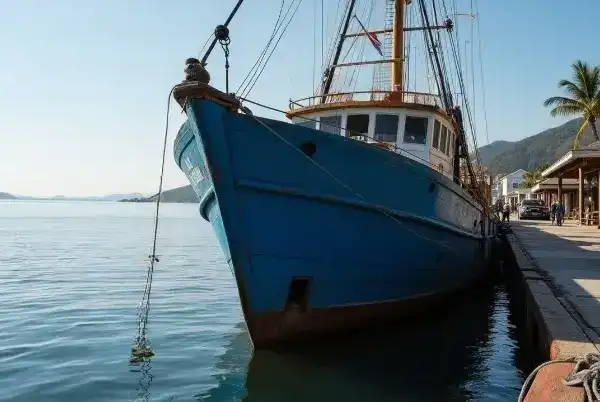Penang, often celebrated for its cultural heritage and bustling street food, is carving out a new identity as Malaysia’s tuna hub. In 2024, the state recorded a staggering increase in tuna imports, with over 431,000 kilograms valued at 7.76 million Malaysian Ringgit (US$1.64 million) brought in, more than double the 177,320 kilograms worth 3.19 million Ringgit (US$674,000) in 2023. This surge, as highlighted by Fahmi Zainol, chairman of the state’s agrotechnology, food security, and cooperative development committee, underscores Penang’s growing prominence in the global seafood supply chain.
A Strategic Hub for Tuna Trade
The numbers alone tell a compelling story of growth. According to figures from the Fisheries Department, Penang’s tuna industry has been on an upward trajectory since the early 2000s, fueled by its strategic location near international maritime trade routes. The state’s proximity to Penang Port and Penang International Airport enhances its appeal as a processing hub and a convenient stopover for foreign fishing vessels. Fahmi emphasized this advantage in a recent interview with The Star, noting that Penang’s logistics network and established food and packaging industries create a robust ecosystem for tuna-related activities.
Beyond logistics, the state government and Fisheries Department have rolled out targeted initiatives to attract investment and bolster the sector. Programs such as the Small and Medium Agro-based Industry Expansion Programme (SPeKS), the Agropreneur Muda Grant Programme (GAM) for young entrepreneurs aged 18 to 45, and the zero-interest Agropreneur Financing Scheme (TUT) are designed to support local operators and draw in new players. “These efforts are about building capacity and ensuring sustainability” said Fahmi, pointing to additional measures like the provision of cold room facilities, processing equipment, and the development of seven new tuna-based products.
Infrastructure and Innovation Driving Growth
Penang’s ambition extends beyond merely increasing import volumes. The establishment of the Tuna Product Excellence Centre in Labuan represents a forward-thinking approach to product development and quality assurance. Meanwhile, infrastructure upgrades at key landing sites like Dermaga Dalam in Butterworth aim to streamline the supply chain from sea to processing facilities. Fahmi explained that some of the tuna passing through Butterworth is temporarily stored before being exported to international markets, a process that strengthens Penang’s role as a transit hub.
International trade missions have also played a crucial role in promoting Penang=se investment opportunities globally. By showcasing Penang’s capabilities, these missions have helped position Malaysia as a serious contender in the global seafood market. Fahmi noted that the state’s efforts align with Malaysia’s broader goal of enhancing its standing in the international supply chain, a vision that appears to be gaining traction as export values recover from past volatility.
Domestic Demand and Economic Impact
While exports are a significant focus, Penang also caters to a growing domestic appetite for premium seafood. Tuna imported from countries like Japan is distributed for local consumption, particularly in urban areas where demand is high. This dual role as both an export hub and a domestic supplier underscores the versatility of Penang’s tuna industry. Although precise data on job creation remains elusive, Fahmi highlighted the sector’s undeniable impact on employment across fishing, processing, logistics, and export services.
Local fishermen and operators are reaping the benefits, with tuna exports fetching significantly higher prices than domestic sales. The ripple effects extend to related sectors such as vessel repairs, fuel supply, and marine services, creating a broader economic boost. The recent issuance of 16 tuna vessel licenses to Astana Conglomerate Sdn Bhd is expected to further enhance Malaysia’s harvesting capacity, promising more economic activity in the year ahead. “This is just the beginning” said Fahmi, expressing optimism about the industry’s trajectory.
Challenges and Opportunities Ahead
Despite the impressive growth, challenges remain. The tuna industry is not immune to volatility, as reflected in fluctuating export values over recent years. Ensuring a steady supply requires ongoing collaboration between vessel operators and downstream entrepreneurs, a priority for the Fisheries Department. Additionally, while initiatives like SPeKS and GAM are promising, their long-term impact on small-scale operators and youth engagement needs careful monitoring to avoid uneven benefits.
Environmental sustainability is another critical consideration. As harvesting capacity expands, questions arise about the potential strain on marine resources. While Fahmi did not address specific conservation measures, the emphasis on infrastructure and innovation suggests room for integrating sustainable practices. If Malaysia is to maintain its upward trajectory in the global seafood trade, balancing economic ambitions with ecological responsibility will be key.
Penang’s Place in the Global Market
Penang’s tuna boom is emblematic of Malaysia’s broader aspirations to assert itself in the global economy. The state’s ability to double its tuna intake in a single year speaks to a combination of strategic planning, geographic advantage, and government support. Yet, this growth also places Penang at a crossroads. Will it prioritize rapid expansion, or will it carve out a niche as a sustainable and innovative leader in the seafood sector?
For now, the outlook is overwhelmingly positive. Industry players anticipate further expansion in 2025, driven by new vessel licenses and continued investment. As Penang solidifies its status as Malaysia’s tuna hub, it offers a glimpse of what targeted policy and local ingenuity can achieve. The question remains how this momentum will shape not just the state’s economy, but its identity on the world stage.















